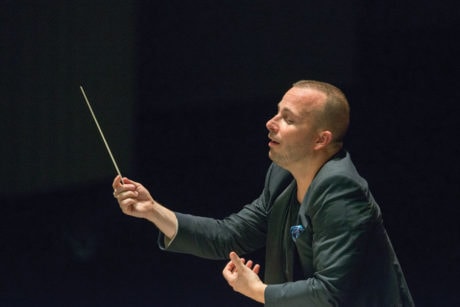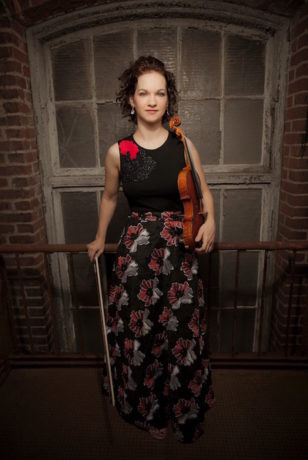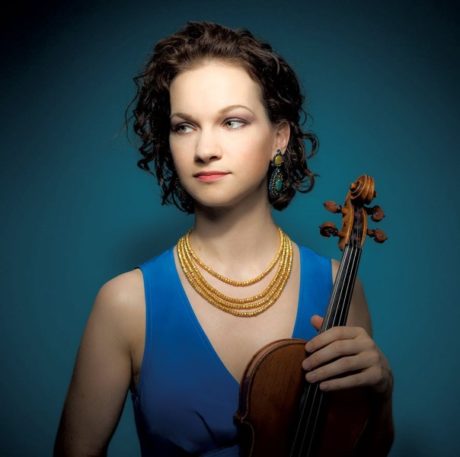The Leonard Bernstein Centenary continues with concerts by Yannick Nézet-Séguin and The Philadelphia Orchestra. Last weekend’s performances featured one of Bernstein’s most interesting (and relatively obscure) compositions — his Serenade (after Plato’s Symposium), for solo violin, strings, harp and percussion.

That Plato Symposium, allow me to remind you, was a series of dissertations in ancient Athens about the nature of erotic love. If you can’t quite recall that, you’re in the company of many educated folks. But the erudite Bernstein was well-versed in philosophy and considered it a fun sport to translate philosophic disputations into music.
The Philadelphia Orchestra saluted Bernstein earlier this year with his West Side Story and his Jeremiah Symphony. The lovely opening melody for solo violin, with lower strings providing background, is in the style of “Somewhere” from West Side Story. Many fans of Bernstein’s Broadway career, however, have never warmed to this piece. It seems like Bernstein in an intellectual, lecturing mode.
The men at the Symposium included the philosopher Socrates, the general Alcibiades, the physician Eryximachus, the tragedian Agathon, the lawyer Pausanias, and the playwright Aristophanes. They all gave speeches about aspects of Eros, the god of erotic love and desire. Pausanius analyzed the attitudes of different city-states relative to homosexuality. Aristophanes said that in primal times people had double bodies, with faces and limbs turned away from one another. Zeus split them apart because he feared their power, and ever since, people have tried to “make themselves whole” again. Alcibiades entered the symposium drunk, and said that he had tried, but failed, to seduce Socrates, concluding that Socrates has no interest in physical pleasure.
Bernstein translated all of this orchestrally, without words. He explained the finale thus:
The famous interruption by Alcibiades and his band of drunken revelers ushers in the Allegro, which is an extended Rondo ranging in spirit from agitation through jig-like dance music to joyful celebration. If there is a hint of jazz in the celebration, I hope it will not be taken as anachronistic Greek party-music, but rather the natural expression of a contemporary American composer imbued with the spirit of that timeless dinner party.
Bernstein’s predilection for Greek culture emerged when he was a student at Harvard and wrote the score for Aristophanes’ play The Birds in the original Greek. Bernstein deeply wanted to gain credibility as a serious classical composer in addition to being a Broadway tunesmith. Serenade was written in 1954, between his Wonderful Town and West Side Story. He wasn’t named Music Director of the New York Philharmonic until three years later.
This was the Lenny that I first met around this time — extremely smart, sassy, ambitious, handsome. He retained those qualities during the 1960s when we did several broadcast interviews, but gradually he became weighted down with cares and responsibilities, took to wrapping himself in capes and became more remote — and ill.

In this Serenade, a lilting waltz is interrupted by an off-kilter counter rhythm. Skittering violins are answered with woodblocks and kettledrums. Cleverness abounds, but the totality is hardly romantic. Therefore a listener is best off if he or she does not expect a serenade about love. The speeches are cerebral, not erotic — nor is Bernstein’s music. Violinist Hilary Hahn plays the roles of each speaker, leading the Grecian discussions. Her tone is sweet, and her technical mastery is superb. She added a gigue by Bach as an encore.
The concert opened with a suite by Thomas Adès (pronounced AH-dez) of music from Powder Her Face. That examination of the promiscuous life of the Duchess of Argyll was the first opera by the British composer, and he has followed it with The Tempest and The Exterminating Angel. Powder Her Face is a chamber opera with a small orchestra, but this suite is a 27-minute piece for a large symphony orchestra, and was commissioned by The Philadelphia Orchestra.
Some opera lovers dislike Ades’s compositions, feeling that he uses sound effects and sonic stunts, but has no lyric gift. (He specifies automobile brake drums, cymbals, glockenspiel, güiro, bongo drum, washboard, lion’s roar, paper bag for bursting, pop gun, anvil, tam-tam, tambourine, tubular bell, whips and wood chimes.)
I find much of his writing to be enjoyable but his operas have mainly surface brilliance. With its foxtrots, tango, waltz and bits of jazz, this suite gave the Philadelphia Orchestra, and us, great fun, regardless of its lack of depth.
After the Adès and Bernstein, Nezet-Seguin led an exciting rendition of Jan Sibelius’s Symphony No. 1. This is one of the best first symphonies by any composer, a full-throated expression of longing and yearning. Starting with a mournful clarinet solo by Ricardo Morales and tympani roll by Don Liuzzi, the symphony built to a thundering climax which brought the audience to its feet.
A Finnish nationalist who wrote Finlandia, which became his nation’s anthem, Sibelius nevertheless studied in Germany and Austria and mastered classical structure. He married his craft to his soul when he wrote this symphony. His eerie, open chords suggest the vast and bleak landscape of Finland, and his ascending melodies represent his nation’s striving for independence from neighboring Sweden and Russia. Despite that spirit, this symphony also contains Tchaikovsky-like crescendos of strings and brass which, of course, bring out the best qualities of this orchestra.
Running Time: Two hours and 15 minutes, with one intermission.

The Philadelphia Orchestra: Hilary Hahn Plays Bernstein was presented December 8-10, 2017 at Verizon Hall at the Kimmel Center for the Performing Arts – 300 South Broad Street, in Philadelphia, PA. For tickets to future concerts, call the box office at (215) 893-1999, or purchase them online.




